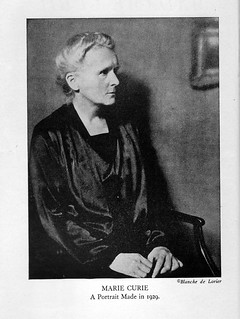
At ten she was "Manya," and her mother died,
defying the ardor of her prayers.
A child asks her mother about the body whorled
around her soul, rooted inside like hair,
dead, but painful when wrenched. The catechism
does not extinguish the question of why God
made us, why we die, prayer a painful spasm.
Manya is afraid of what is in her blood
that makes her live, afraid that God created us to love
only him. Her mother taught herself to cobble shoes,
held Manya's foot to the leather and clove
the shape of walking, as if she could choose
where she was going. Her mother's last gesture
was the sign of the cross, beginning the world's fracture.
(Excerpt from Her Crucible: A Poem Series About Marie Curie, by Margaret Almon)
My Marie Curie years involved reading everything I could find about her, and letting the words simmer, as if they were in Marie's big cast iron pot, where she boiled slag down to Radium. Marie was born in Poland to Bronislawa and Vladislav Sklodowski, a Roman Catholic and an atheist. I was drawn to Eve Curie's account of Marie's intense prayers for her mother's recovery from tuberculosis, and her despair when her mother died, and how our theology is shaped by our entire being, our families, country, gifts and losses.
Marie took her intense focus from prayer in a formal sense, to prayer in action in her laboratory, which was really a shed, a humble place. She had a calling, a real sense of vocation, which in spite of her appearance on many websites as a "Famous Atheist," strikes me as a spiritual quest. I picked up the biography again, and noticed that while Marie's mother's last gesture was the sign of the cross, her last words to her family were "I love you." I was surprised, and did not remember reading this sentence when I wrote the poem.
We cannot take in everything at once. Some words stick like burrs to our clothing, and others fall aside. I hope the "I love you" stayed with Marie, even in the fracture of her world.
Beautiful--what a shimmering glass this piece is.
ReplyDeleteOh, Margaret, this is wonderful. From Michelle the scientist we learn about prayer, and from you the artist we learn about science. How cool is that?!
ReplyDeleteSo very cool! I loved doing this exchange with Michelle.
DeleteOh, very lovely. I don't know much about Marie Curie. It's true that we are shaped by so many varied elements in our lives and in the lives of our ancestors.
ReplyDeleteNow off to read your words on Margaret's blog
ReplyDeleteBeautiful! Simply beautiful -- makes me hungry for more of Margaret's poetry!
ReplyDeleteMichelle, I love the last sentence of your introduction! What a wonderful metaphor to tie together my writing and my art.
ReplyDelete